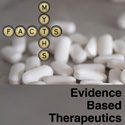In episode 79, Mike and James get back to trying to answer questions posed by our wonderful listeners. We both, in our own minds, give wonderful, thoughtful and sensitive answers to issues associated with diabetes, statins, metformin, strep throat etc. Unfortunately, our producer Chris edited all these out and you are left with a lot of ranting and raving from the duo. At the end of the podcast, James and Mike realise Chris has been editing all the podcasts this way and they go searching for a new producer.
Show notes
Tools for practice
Statins overall benefit chart
University of Edinburgh Cardiovascular Risk Calculator
1) UKPDS 34 metformin Lancet 1998;352:854-65
2) ATLAS 3164 patients with class II to IV heart failure randomised to receive either 2.5 to 5.0 mg daily or 32.5 to 35 mg daily of lisinopril for approx 4 years Circ 1999;100:2312-8
3) Statin dose meta-analysis response CMAJ 2008;178:576-84
4) Metformin Vit B12 deficiency Arch Intern Med 2006;166:1975-79
5) Strep test Ped Emerg Care 2001;17:272-8 10% prevalence – PPV of 53% and a NPV of 97% 40% prevalence – PPV of 87% and a NPV of 82%
6) Scoring system for strep throat CMAJ 1998;158:75-83 CMAJ 2000; 163:811-15



